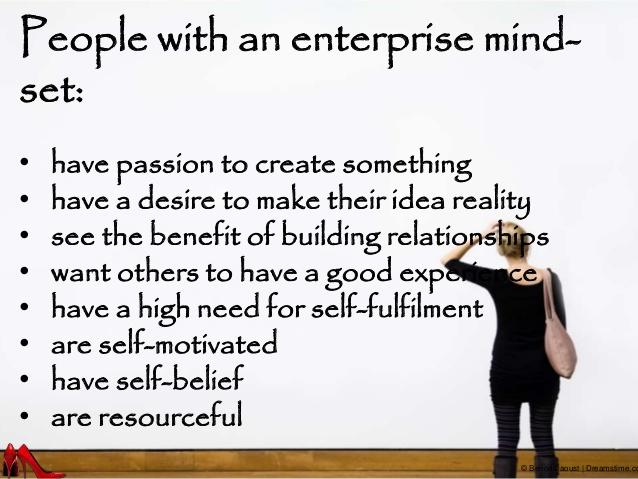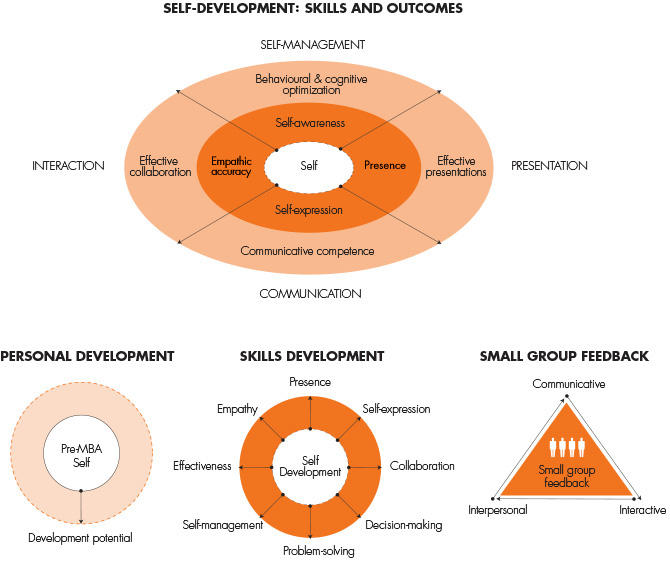The fast-expanding entrepreneurial businesses need managers who can demonstrate a particular set of characteristics. These managers need to work with diligence to recognize and identify the company’s needs with the sole focus on improvising ways of meeting them. Contrary to what many people believe, “enterprising” managers are not those whose ambitions lean towards self-employment.
They are company heads who boast about a mix of leadership, individuality, and creativity. Usually, they have enterprise attributes that revolve around their skills, knowledge, behaviors, and work as shown in Appendix 1. With these attributes, enterprising managers can guarantee a culture of creativity, innovation, opportunism, and risk-taking among other qualities that enable intrapreneurship and entrepreneurship, the transfer of knowledge, and the underpinning of employability (Keeble & Tyler 2005). What differentiates enterprising managers from the other company leaders revolves around their qualities.
One of their characteristics is the ability to handle and deal with risks that come their way, including those that face the company. An enterprising manager has to get prepared for working in a situation that is filled with many risks and uncertainties. He or she is able to strive towards attaining the goals and objectives while making necessary decisions in a situation that lacks some critical information or resources.
Most importantly, enterprising managers are result-oriented. They are dedicated to making crucial decisions to get things done. Such a leader in the “I can do it” person, as opposed to the one who is only ready to pass tasks to others. The best part is that he or she is energetic and has the energy to do the tasks. He or she has the desire to contribute to the results, as well as see that his or her contributions bear fruits. Since they prefer hard work, enterprising managers have the potential to grow at both personal and organizational levels.
Besides his or her ability to develop at a personal level as shown in Appendix 3, an enterprising manager can help his or her colleagues to improve their performance because he or she is a team player. He or she knows how to make others work while at the same time working with them.
Even when they occupy the highest post in the top-level management, enterprising managers do not get complacent or bossy because they are what Moss Kanter (2004) refers to as the ‘middle managers.’ They focus on innovative ways of making other employees work hard to ensure that their respective companies attain their goals and objectives. Most of them occupy the middle management level with the hope of making it to the top, but even those at the highest level do not get become reluctant (Kanter, 2004).
Enterprise Attributes
In the modern world, dynamism is the mainstay feature of management. Hence, every manager needs to have more than one quality of running an enterprise. In general, a manager should have the following enterprise attributes- excellent knowledge, recommendable behaviors, positive attitude, and exemplary skills.
Unless a manager has these characters, he or she might struggle to attain success or become what the analysts refer to as the “modern” manager – a visionary, flexible, innovative, team player, and hardworking leader. Appendix 2 expands on the attributes that enterprise managers should demonstrate. The following is an in-depth review of how these enterprise attributes help managers to excel in the ever-changing working environment of the current time (Kirkley 2016).
Exemplary Skills
According to Chell (2013) who is a tutor at Kingston University, a skill is a primary quality that every manager needs to possess. She holds that issues such as the primary nature of skill and the examination of such expertise are crucial to the theoretical and comprehensive understanding of the process of entrepreneurship, which is an innovative aspect of a manager. In her analysis of skills, she holds that numeracy and literacy skills steer young people to improve their employability chances. They also enhance their (young people) productivity level at the company in line with seeking higher job positions.
Such young talents remain competitive at the international front. However, it is imperative to note that numeracy and literacy skills are only necessary, but not sufficient for a manager to run or help a company to grow. In general, a leader needs to have a set of skills, abilities, competence, motivation, creativity, and knowledge to excel at the highest level of management. However, his or her skilfulness determines how best a manager can handle tasks efficiently (Chell, 2013).
Excellent Knowledge
Another enterprise attribute that contributes to the productivity of any organization is knowledge. All businesses demand an extensive set of knowledge, which comprises their understanding of the industry environment, customer needs, and staff members’ experience and skills. The manner in which a business collects, exploits, and shares the same knowledge can prove crucial to its chances of attaining success. However, this factor does not just apply to large multinational corporations.
The management of Knowledge can benefit any stakeholder of a business. It is the responsibility of the enterprise to utilize the primary sources of knowledge present to the business. It should gather and/or exploit the available information to build a strategy of knowledge for the business. What most managers must understand is that using knowledge in the business does not necessarily mean thinking about ways of introducing new services and products or even implementing ingenious new measures for selling the same items.
Many managers fail to recognize the knowledge that already exists in the company. Hence, they look for new sources. Knowledge exists in the form of employee experience, the processes and quality of the services and products, the company’s documents, files, and data, and the future activities, ideas, and plans for the services and goods (Kirkley 2016).
Recommendable Behaviours
Another enterprise attribute that also drives businesses to success includes employee behaviors. One of the most significant goals of organizational behaviors is to have a proper understanding of why workers behave in the manner in which they do. From a broad perspective, they involve four factors, namely, organizational citizenship, job performance, turnover, and absenteeism. It is evident that the first pair of behaviors is pleasant while the last set is considered unpleasant.
In essence, these four behaviors are not the only factors that comprise this enterprise attribute. Understanding how they influence each other opens a platform for having insights for analyzing the other organizational behavior. Job performance is the rate at which an employee succeeds in completing the tasks outlined in the description for a particular job. Given the differences in the descriptions of various duties, there arises a difference in the contents of job performance. On the other hand, organizational behaviors are those that are discrete, including voluntary services that employees offer to benefit the company or help others in contributing to business productivity (Kirkley 2016).
One of the undesirable behaviors that derail the growth of an organization is absenteeism, which can be defined as an unscheduled failure to report to work. Absenteeism is costly to the organization because it comes with various unpredictable outcomes, which affect the management’s power and plans to control the budget of the firm or a department. A company rarely wishes to experience a turnover where employees decide to quit the job or terminate their contractual relationship with the company.
Absenteeism and employee turnover poses various harmful consequences to the company, although the latter has more setbacks when compared to the other. Some of the issues associated with it include poor service to customers and a slump in the overall performance of the company. When an employee quits, his or her job still needs someone to perform. Hence, the company has to spend time and money recruiting, hiring, and training a new worker.
As a result, the organization suffers from reduced productivity. Nonetheless, it is important to note that not all turnovers are costly. A turnover becomes a huge problem when a high performing staff member quits while the departure of a less productive worker may come as a blessing in disguise for the company. Such an occurrence gives the organization the chance to boost the morale of the remaining employees towards working hence improving the productivity of the company (Mair 2002).
Positive Attitude
How the employees behave at work depends on their feelings about working at that workplace. For this reason, one would only make sense of how the workers behave if he or she understands their attitudes towards the work at hand in terms of their feelings, opinions, and beliefs about various aspects of their job environment. People’s attitudes at home are likely to involve the things that make their lives comfortable, including what to eat, where to live, and/or the family members among other things. However, at work, the two job attitudes that can influence how the same individuals behave are organizational commitment and job satisfaction.
Job contentment refers to how people feel towards their jobs. Several studies, including the one conducted by the Society for Human Resource Management (Gallup), reveal that job satisfaction is an essential work attitude. On the other hand, organizational commitment refers to the emotional attachment that employees have not only towards the organization they work for but also towards their employers.
An employee who is highly committed to the company embraces and/or believes in the values of the company. He or she is willing and ready to strive to meet the business goals and objectives while at the same time showing a profound desire to stick around with his or her bosses. Often, employees who have an undying love for their place of work refer to their organization as “we” whereas the others use “they” in a similar case. For example, those who love their employers would say, “We offer best services” while the other parties are likely to report the same message by saying “this company offers best services.” Therefore, the way employees refer to their place of work indicates the type of identification and attachment they have with it (Shariff & Saud 2009).
Justification
While most well-established managers, almost all of which are at advanced ages, have these enterprise attributes in abundance, their younger counterparts need to have and/or practice ways of implementing them. For example, with the right set of skills, young managers can gain expertise and professionalism that are needed to handle the tasks. They can steer the company towards attaining its goals and objectives.
Similarly, such administrators need to gain valuable management knowledge that will help them in running errands at the company. As a result, they stand a chance to lead and work with other proficient employees. Knowledgeable managers know when and how to delegate duties to the other workers. Besides motivating and boosting their counterparts’ morale to work, they identify the hard work and the less productive lot of the employees.
With the right organizational behaviors (organizational citizenship), a young manager can improve his or her productivity, including the performance of other employees while at the same time boosting the overall production level of the company. If young managers become ambassadors of the company, they will not adopt other undesirable behaviors such as absenteeism and turnover. Instead, they will use their loyalty as the means for ensuring the progress, growth, and expansion of their place of work. Similarly, young managers need to adopt a positive attitude towards the job. In other words, if they are satisfied with the conditions of their jobs, they become productive by striving to help the company to grow.
All of the four enterprise attributes are crucial to the company in one way or another. My belief is that skills and knowledge are more beneficial to the workplace than the behaviors and attitudes of the managers, which tends to focus on his or her relationship with the other workmates. Skills enable the management to innovate practical ways of helping the business to improve its performance. Skillful managers focus on using their talents and prowess in ways that are productive to the company. Unless a manager has management knowledge, he or she is likely to get on the wrong track in most of the company’s operations. At the same time, any manager with this enterprise attributes is likely to develop the right behavior and attitude towards his or her place of work.
Developing Managers
Every company can develop its employees into future managers and leaders using any of the following strategies. For starters, the organization should rotate the employees through different jobs to help them in gaining experience. This exercise also involves challenging them with unfamiliar jobs. The notion of this approach is that managers only perform best when they have sufficient or abundant knowledge about the job itself.
The mastery comes from getting exposure from the different tasks in the company. Other strategies for helping employees to achieve the higher ranks of job positions include coaching, seeking feedback from them, and creating mentoring programs. In the case of the mentoring schemes, employees get a first-hand experience of managing since they interact with managers who also mentor them, coach, and/or give insights of how to run errands for a company at the management level.
Sometimes, learners do not take in everything or the most important things the company teaches them. Hence, the best way to gain knowledge is to seek their feedback. This approach also enables the organization to evaluate the employees’ progress in management. Only those with ability, readiness, and affinity to learn new things can become enterprise managers who are equipped with all the necessary skills that are needed for management.
Reference List
Chell, E 2013, ‘Review of skill and the entrepreneurial process’, International Journal of Entrepreneurial Behaviour & Research, vol. 19, no. 1, pp. 6-31.
Kanter, M 2004, The Middle Manager as Innovator. Web.
Keeble, D & Tyler, P 2005, ‘Enterprising Behaviour & the Urban-Rural Shift’, Urban Studies, vol. 32, no. 6, pp. 975-997.
Kirkley, W 2016, ‘Entrepreneurial Behaviour: The Roles of Values’, International Journal of Entrepreneurial Behaviour & Research, vol. 22, no. 3, pp. 1-211.
Mair, J 2002, Entrepreneurial Behaviour in a large traditional firm: Exploring key drivers, Research Paper No. 466, IESE University of Navarra, Barcelona.
Shariff, M & Saud, M 2009, ‘An Attitude approach to the prediction of Entrepreneurship on Students at Institution of Higher Learning in Malaysia’. International Journal of Business Management, vol. 4, no. 4, pp. 129-135.
Appendices
Appendix 1: Enterprising Manager Attributes

Appendix 2: Enterprise Mindset

Appendix 3: Manager’s Growth
